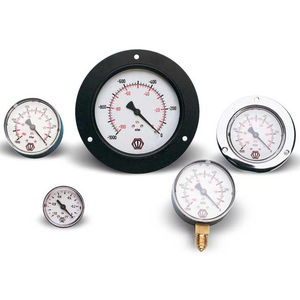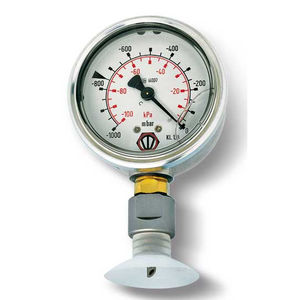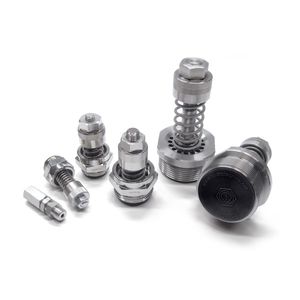
- Company
- Products
- Catalogs
- News & Trends
- Exhibitions
Diaphragm vacuum regulator 110 seriesdial
Add to favorites
Compare this product
Characteristics
- Technology
- diaphragm
- Display
- dial
- Vacuum range
Max.: 800 mbar
(11.603019018 psi)Min.: 1 mbar
(0.014503774 psi)
Description
These devices control the level of vacuum, maintaining it constant at the pre-set value (secondary vacuum), regardless of the network's flow rate and the fluctuations in vacuum level (primary vacuum).
They operate by membrane-piston and exploit the pressure differential between the secondary vacuum and the atmospheric pressure.
Unlike the vacuum control valves, reducers do not release air into the circuit, thereby allowing for the creation more grip points taken at different degrees of vacuum, from a single vacuum source.
The level of vacuum is adjusted manually by turning the knurled thumb screw clockwise to increase it, and counter clockwise to decrease it.
Technical features
- Operation: membrane-piston regulator
- Adjustable operating pressure: from 800 to 1 mbar abs.
- Flow rate: from 2 to 160 m3/h.
- Room temperature: from -10 to +80 °C
- Installation position: any
Usage
The best use of vacuum reducers is in centralised plants where, regardless of the plant's level of vacuum, each outlet can be adjusted within that value. Moreover, they are necessary whenever the working vacuum must be lower than the primary vacuum.
Catalogs
No catalogs are available for this product.
See all of VUOTOTECNICA‘s catalogsOther VUOTOTECNICA products
Vacuum measurement, control and adjustment instruments
Related Searches
- VUOTOTECNICA handling suction cup
- VUOTOTECNICA bellows suction cup
- VUOTOTECNICA circular suction cup
- VUOTOTECNICA flat suction cup
- Lifting vacuum suction cup
- Vacuum vacuum suction cup
- Manipulator arm with suction cup
- Plastic vacuum suction cup
- VUOTOTECNICA gripping suction cup
- Rubber vacuum suction cup
- VUOTOTECNICA oval suction cup
- VUOTOTECNICA vacuum cup holder
- Vacuum suction cup for the food industry
- VUOTOTECNICA rectangular suction cup
- VUOTOTECNICA glazing suction cup
- VUOTOTECNICA sheet metal suction cup
- Vacuum pad for the automotive industry
- VUOTOTECNICA clamping suction cup
- Suction cup for heavy-duty applications
- Vacuum regulator
*Prices are pre-tax. They exclude delivery charges and customs duties and do not include additional charges for installation or activation options. Prices are indicative only and may vary by country, with changes to the cost of raw materials and exchange rates.














